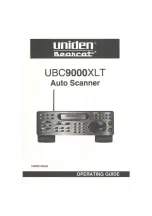
42
A General Guide to Frequencies
Note: Remote control stations and mobile
units operate at 5 MHz higher than their as-
sociated base stations and relay repeater
units.
BAND ALLOCATION
To help decide which frequency ranges to
scan, use the following listing of the typical
services that use the frequencies your scan-
ner receives. These frequencies are subject
to change, and might vary from area to area.
For a more complete listing, refer to
Police
Call Radio Guide
including Fire and Emer-
gency Services, available at your local Ra-
dioShack store.
Abbreviations
Services
AIR
Aircraft
BIFC
Boise (ID) Interagency Fire Cache
BUS
Business
CAP
Civil Air Patrol
CCA
Common Carrier
CB
Citizens Band
CSB
Conventional Systems
CTSB
Conventional/Trunked Systems
FIRE
Fire Department
HAM
Amateur (Ham) Radio
GOVT
Federal Government
GMR
General Mobile Radio
GTR
General Trunked
IND
Industrial Services
(Manufacturing, Construction,
Farming and Forest Products)
MAR
Military Amateur Radio
MARI
Maritime Limited Coast
(Coast Guard, Marine Telephone,
Shipboard Radio, and Private Stations)
MARS
Military Affiliate Radio System
MED
Emergency/Medical Services
MIL
U.S. Military
MOV
Motion Picture/Video Industry
NEW
New Mobile Narrow
NEWS
Relay Press
(Newspaper Reporters)
OIL
Oil/Petroleum Industry
POL
Police Department
PUB
Public Services
(Public Safety, Local Government,
and Forestry Conservation)
PSB
Public Safety
PTR
Private Trunked
ROAD
Road & Highway Maintenance
RTV
Radio/TV Remote Broadcast Pickup
Base Stations
451.025–454.950 MHz
Mobile Units
456.025–459.950 MHz
Repeater Units
460.025–464.975 MHz
Control Stations
465.025–469.975 MHz
Activities
Frequencies
Summary of Contents for 20-466
Page 54: ...54 Notes Notes...
Page 55: ...55 Notes...















































